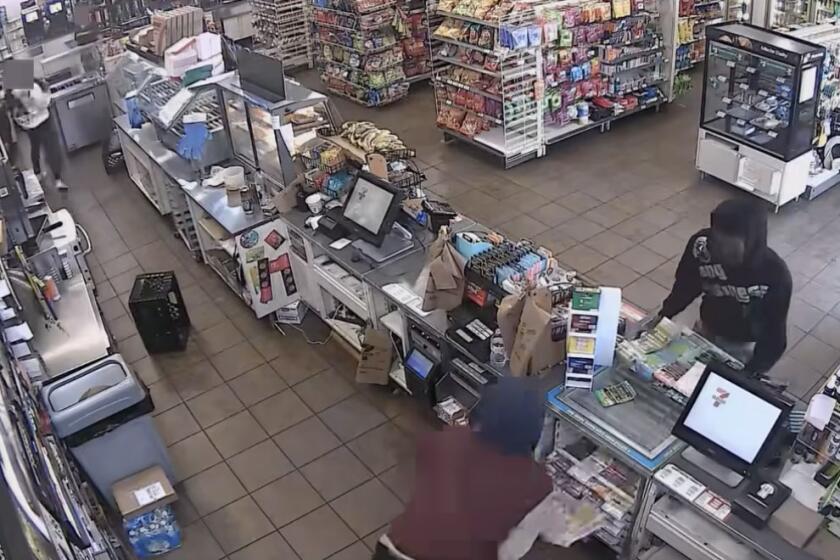L.A. makes it easier to delete names on gang injunction lists
Los Angeles prosecutors on Monday announced an overhaul of a controversial gang injunction program, responding to years of criticism that the system makes it nearly impossible for people who turn their lives around or are mistakenly placed on the list to get out from under a court order.
The city attorney agreed to change the process after City Council members and community leaders complained that not one of the 11,000 people named in gang injunctions during the last two decades has ever been able to get off the list.
The injunctions against 50 gangs are a cornerstone of the city’s battle against street gangs, and the changes come as authorities launch a crackdown in response to a spike in gang crimes last year.
Prosecutors obtain injunctions from courts, prohibiting those named -- under threat of criminal prosecution -- from loitering in public with others named in injunctions, possessing or using alcohol, disobeying gang-imposed curfews and trespassing.
Critics, however, say the injunctions have also hurt people who have wanted to leave gang life, making it hard to get jobs.
In some neighborhoods, where gang ties are broad and deep, injunctions mean brothers can’t ride in the family car together to work, and classmates can’t walk to school together without violating the court order.
In response, City Atty. Rocky Delgadillo said Monday that he has created a new, formal system under which someone can have their name removed from an injunction through a hearing with top administrators from his office.
Delgadillo also dropped a requirement demanding that anyone who wants to be delisted first publicly renounce membership in the gang in which he or she allegedly was involved. None have -- partly in fear of retaliation by gang members.
Under the new rules, officials will establish an independent review process by prosecutors to examine the evidence against each person proposed to be targeted by an injunction.
“We listened to community and civil rights leaders, and took their concerns to heart,” Delgadillo said.
The changes won praise from those who have argued that the injunction rules can be unfair to certain communities where gang ties run deep.
“It is important we do not criminalize communities, especially communities of color,” said John Mack, president of the Los Angeles Police Commission and former head of the Urban League in Los Angeles.
In Nickerson Gardens, a public housing project in Watts where a gang injunction is in place, there was a sense of cautious optimism as word spread of the new policy.
“This came about because of the community, because somebody finally listened to the community,” said Donny Joubert, a 40-year resident of Nickerson Gardens who runs the project’s recreation leagues.
In his complex -- home of the Bounty Hunters clique of the Bloods -- residents have long complained that young men with no gang ties were unfairly added to the gang injunction, saddling them with criminal records.
“You had guys who never belonged to a gang, who went to school, came home, hung out in the rec center playing basketball in the evening, and they’d wind up on the injunction,” Joubert said.
Although some residents have been complaining for years, the issue didn’t reach critical mass until last year, when several City Council members demanded that Delgadillo explain why no one has ever gotten off the injunction list.
Councilwoman Janice Hahn, who supports the use of injunctions but had called for the overhaul, often talked about the case of one man who had graduated from Jordan High School and received a football scholarship to the University of Nebraska, but could not get his name off the injunction list.
“There is nothing more egregious than taking a young person and
“That is wrong, and it shall never happen again in this city.”
In 1987, Los Angeles was one of the first cities to introduce the gang-abatement injunction, and has since increased the number of court orders to 33, covering more than 61 square miles of claimed gang territory.
Delgadillo said the injunctions have been successful in Los Angeles, reducing serious crime in some of the “safety zones” where the injunctions operate.
Los Angeles Deputy Police Chief Gary Brennan said the new guidelines are important because gang injunctions will not work if the public does not trust that they are being enforced in a fair way.
“This initiative is a significant step forward in the evolution of gang injunctions because this initiative goes right to the heart of the issue of credibility,” he said.
The new process is designed to make it easier for someone to get off the injunction list -- and without having to hire an attorney.
A new form will be provided, starting next month, to be filled out by the person covered by the injunction, petitioning for removal.
A hearing will be held in which the person can provide character witnesses and other evidence that he or she is not now or never has been a gang member.
The hearing will be held by a panel of top executives in the city attorney’s office who are not part of its gang enforcement office, and the decision will remain confidential, to avoid putting the petitioner in jeopardy.
(Prosecutors also can present evidence explaining why the injunctions should remain.)
The decision on whether to target an individual for an injunction has been based partly on whether the person was in the Cal/Gang database, a computerized list of people who police believe have been active in gangs in the last five years.
Critics have said that the list -- compiled by police officers and prosecutors -- is not reliable.
Once a judge issues an injunction against a gang, officers have been able to add more people they have identified as gang members on their own by serving them papers on the street.
But under the new policy, the decision must be approved by a supervisor in the city attorney’s office and based on documented evidence establishing gang membership “beyond a reasonable doubt,” a higher standard than the current “clear and convincing evidence,” Delgadillo said.
In addition, all new gang injunctions will be subject to a review every three years by city attorney’s office executives to determine whether those listed are still active gang members.
The new guidelines are a “positive step,” but do not go far enough, said Hector Villagra, staff attorney for the American Civil Liberties Union of Southern California.
He said his reading of the guidelines indicates that someone petitioning the city to be removed from a gang injunction faces a burden of proving that he or she is not an active gang member.
“For this to be meaningful, I think the burden should remain with the city attorney to prove gang membership,” Villagra said.
“Otherwise, you might still have the city sweeping too many people into injunctions.”
The city attorney released the new guidelines along with a review that concluded the gang injunction program is an important tool for fighting gang violence, which increased 15.7% last year in Los Angeles after years of decline.
“Experience, independent studies and crime statistics tell us that one of the most effective weapons in our arsenal against gangs is the gang injunction,” Delgadillo said.
*
sandy.banks@latimes.com
More to Read
Start your day right
Sign up for Essential California for news, features and recommendations from the L.A. Times and beyond in your inbox six days a week.
You may occasionally receive promotional content from the Los Angeles Times.







